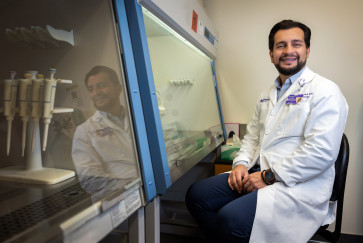Food allergies can turn holiday cheer into stress and anxiety for millions of Americans. But it doesn’t have to be this way, says Melissa Engel, a psychology postdoctoral fellow at the Center for Food Allergy & Asthma Research (CFAAR) at Northwestern University.
“While cookie exchanges, gingerbread making and hot cocoa drinking scream holiday cheer, they may induce anxiety and social exclusion in individuals with food allergies,” said Engel, who also is a fellow at Lurie Children’s Hospital and has lived with food allergies her entire life.
“Many of the children I work with discuss the burden of watching others joyfully participate in food-related activities while they feel like they are missing out. People with food allergies often speak of wanting to appear ‘normal’ which is difficult when allergens are prominent.”
Why this matters, even more right now
The urgency of food allergy awareness has been underscored by recent tragedies, including the death of a popular Disney influencer who suffered a fatal allergic reaction.
Food allergies are on the rise and affect more than 33 million people in the U.S. — nearly one in 10 people. Given the centrality of food to holiday festivities, the risks are heightened this time of year.
“In a classroom, a child may worry about having a reaction due to their class decorating cookies that contain their allergen. They may also worry about judgement or teasing from others for bringing their own safe treat. Likewise, at a work holiday party, an adult may worry about allergic reactions from exposure to holiday treats, as well as being perceived by others as ‘difficult’ or ‘mistrusting’ for asking many questions or bringing their own food,” Engel said.
What you can do about it
Engel encourages individuals with severe food allergies to choose a strategy — whether it’s communicating with hosts, eating beforehand or bringing their own safe food.
“Social gatherings are much more enjoyable when not feeling hangry,” she said.
Engel’s advice extends to hosts, who “can directly ask guests with food allergies, ‘How can I best accommodate your allergies so that you can be safe and have fun?’ For some, this may mean sending ingredient labels in advance or having certain packaged products on hand, like specific brands of cookies or candy.”
She adds, “Allowing guests with food allergies to serve themselves first can help prevent cross-contact. For others, simply letting them bring their own safe food without fuss may be all they need to feel comfortable.”
The key takeaway — don’t assume; just ask each individual guest with food allergies how you can make them feel safe and included.”
Take it from this passionate advocate
Engel and other Northwestern experts gathered this week for a webinar on managing food allergies during the holidays with 12-year-old Zacky Muñoz, a passionate advocate and social media influencer with severe food allergies.
Muñoz, who was born with life-threatening food allergies, had his first anaphylactic reaction at age 6 when his “safe food” was swapped with an allergen at school, requiring an epinephrine injection and a hospital visit. He had a similar experience just a month later. These incidents sparked his family’s commitment to raise awareness and ensure a safer environment for those living with food allergies.
Muñoz has been a driving force in changing legislation and building a stronger, more informed community. Priscilla Hernandez says of her son, “Zacky has turned his food allergies into his superpower. Even at his age, he has an optimism and strength that inspire everyone around him. He sees his differences as what makes him unique.”


